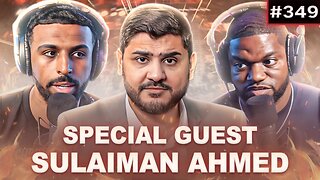Frankenstein, Blade Runner and the search for God
I recorded the video two ways on my home computer. Firstly as a live video on locals. Secondly as a Photobooth app video on my Mac. Both had a delay of a few beats between my speaking and my mouth moving. But I largely addressed the issue for my Rumble upload
===
The two stories, Mary Shelley’s Frankenstein and the movie Blade Runner are both to do with a search for God, but not in the same way, and in neither case was the author aware of the full ramifications of their search. It shows God moving in ways that He rarely gets credit for.
Mary Shelley’s Frankenstein had a beginning, a germ of which began with a dinner being held with Lord Byron, Percy Byshe Shelley and his runaway bride, Mary. First published in 1818, when Mary was twenty years old, she had first considered the book in 1815, when Mary had toured Europe with Percy and Byron. They had had dinner in Gernsheim, eleven miles from Frankenstein castle where two centuries before, an alchemist had been engaged in experiments. Luigi Galvani had discovered ‘animal electricity’ animating the legs of dead frogs. Galvanism was the topic of conversation, and they agreed to write horror stories around the concept. Seventeen year old Mary, persevered.
Life got in the way of the story. Percy’s first wife suicided in 1816, and so he married Mary, who was pregnant. Their daughter was prematurely born and soon died. And so Mary had inspiration for her characters and motivations. However, Mary could draw on her whole young life for inspiration. Her celebrated mother, Mary Wollstonecraft had died a month after giving birth to Mary. Mary had struggled accepting her step mother from age 4. By age 15, Mary had rebelled, running away with Percy.
Mary’s story Frankenstein, styled as a modern Prometheus, had antecedent ideas from Christianity. She contemplated creation and related it to childbirth as well as electricity, in fusion. However, Frankenstein’s monster was not created by God, and so suffers, lacking a soul. And because the monster has no soul, it is destructive. Mary’s vision is very unsophisticated, but compelling in a pop culture identification.
Mary’s concept of using electricity to get the dead to move was a concept scientists in Great Britain tried to explore. They even got approval to test the idea on a prisoner who was executed, and his body was used to see if electricity could effectively animate it. There was pathos in getting the criminal to accept the experiment. The prisoner had killed his wife, and said he knew he deserved to die. However, he feared his animated body might be evil, and kill someone innocent. The experiment failed, with external electricity applied to muscles scalding the skin prior to getting minimal movement. After Percy died by accident in 1822, Mary took on the task of protecting his literary legacy.
The movie Blade Runner 1982, produced by Ridley Scott, was a futuristic Frankenstein. While the Christian ethics still surface as pop culture references, the writers included some overlooked content. Towards the end, as the Monster is dying, it is still fighting to live. The Blade Runner is chasing it, then it turns the tables and chases the Blade Runner. In one scene, the monster’s hand is cramping, and it pushes a nail through it. The Blade Runner stumbles and is clinging to a girder for his life. Monster had clasped a dove as it approaches the blade runner clinging to life. Monster could commit a coup de grace, but instead releases the dove, and with the hand with the nail, lifts the blade runner to safety. Then Monster talks of the profound life experiences that will pass when he dies. It is a clear resurrection reference that the director seems to walk back in later films.
Many hunger for God, and look for God in movies and books, even unsophisticated work like Mary’s Frankenstein or co-opted works like Blade Runner. Even as many involved may try to devalue the story of Jesus, yet they implicitly include Him in their work. It is not the same as reading the Bible, but it allows insights for those who have.
https://voiceddb.locals.com/post/1557695/frankenstein-blade-runner-and-the-search-for-god
AUAWN0117122
-
 5:49
5:49
Faith and Philosphy
1 year agoA deaf Musician's Magnum Opus
102 -
 1:24:15
1:24:15
Mally_Mouse
7 hours agoLet's Hang!!
33.7K6 -
 1:19:06
1:19:06
TENET Media
10 hours agoGuest Vinoo Varghese on NY ‘Ghost Gun’ Case, UCLA Israel-Palestine Riot ft. Frank | The MC Hour #24
46.6K17 -
 1:01:08
1:01:08
The StoneZONE with Roger Stone
12 hours agoHow The US Gov't Spies On You Without Probable Cause - Like They Did To Carter Page – The StoneZONE!
66.7K25 -
 1:40:04
1:40:04
The Big Mig™
1 day agoSpeaker Johnson, "You're not in our Club JR MAJEWSKI, No Funding for You"!
63.9K39 -
 2:25:24
2:25:24
WeAreChange
11 hours agoAstraZeneca Admits In Court Documents Its Covid Vax Can Cause Rare Blood Clots!
109K74 -
 LIVE
LIVE
Right Side Broadcasting Network
5 days agoLIVE REPLAY: President Trump Holds a Rally in Freeland, Michigan - 5/1/24
2,577 watching -
 2:16:53
2:16:53
Michael Feyrer Jr
10 hours agoGet Your Live Streaming Questions Answered! LIVE
44K3 -
 2:12:14
2:12:14
Fresh and Fit
12 hours agoSulaiman Ahmed Meets Fresh&Fit
115K96 -
 1:54:22
1:54:22
The Quartering
12 hours agoNew Laws Infringe On Speech, O' Keefe CIA Expose, Campus Crackdown & Trump Trial
74.4K27